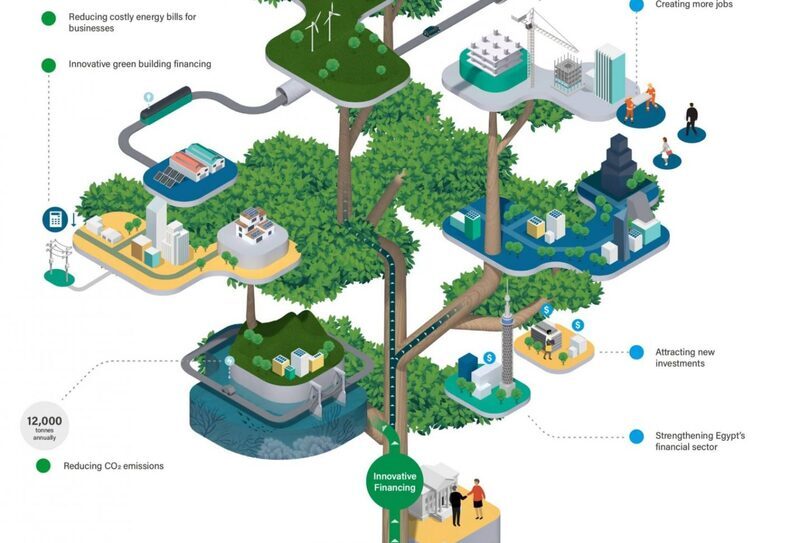
Water Conservation: 7 Simple Ways to Save Water at Home and in Your Business
Water is one of our most precious resources, yet it is often wasted without thought. ...

The International Finance Corporation (IFC) is investing $100 million in Egypt’s first private sector green bond to help unlock finance for climate-smart projects, reduce greenhouse gas emissions, and support the country’s transition to a greener economy.
The bond, issued by Egypt’s Commercial International Bank (CIB), the country’s largest private bank, will help CIB increase lending to businesses that want to invest in eco-friendly initiatives, including green buildings, renewable energy and energy efficiency, markets which are still nascent in Egypt.
The debut issuance is an important milestone in a multi-year effort by the government, Egypt’s private sector and IFC to grow Egypt’s capital market for green finance in the country and to help close infrastructure financing gaps.
“Egypt is taking strides towards the achievement of its 2030 development agenda, which is in line with the global sustainability goals. In 2020, the Government of Egypt launched its first sovereign green bond offering, that was five times oversubscribed. At the Ministry of International Cooperation, we aim to capitalize on this success by curating impactful partnerships to push towards the green recovery,” said Dr. Rania Mashat, Egypt’s Minister of International Cooperation.
“The IFC and CIB partnership is proof of the global eagerness for more private-led green investments. Green bonds are the key for a purpose-driven economy, that pushes towards sustainable projects and encourages investors into not only thinking but as well acting green.”
“Because we realize the importance of promoting sustainable finance as a pathway to the 2030 agenda, the SDGs and the Paris agreement, we have been diligently working to put forward all required regulations and simultaneously working on market development and engaging potential issuers by removing any challenges that might face them,” said Sina Hbous, head of the sustainable development department at Egypt’s Financial Regulatory Authority.
“Today we reap the fruits of these efforts with the first corporate issuance of green bonds in Egypt in the amount of an impressive $100 million. This is just the beginning. We are sure that more companies will be encouraged to consider green bonds as a viable instrument to meet their financing needs while, simultaneously promoting environmental impact.”
“We are building on our multi-year strong partnership with IFC to expand our funding options and introduce a new asset class to the Egyptian capital market,” said Hussein Abaza, CIB Chief Executive Officer and Managing Director. “We see a growing demand for climate finance in Egypt and this innovative instrument will help us promote environmentally friendly projects and fight climate change.”
The IFC’s investment is part of a wider strategy to create markets by marshaling private sector capital to meet the increasing demand for green buildings, renewable energy, and energy-efficiency projects.
“Addressing climate change is a priority for IFC in Egypt and, more broadly, across the Middle East and North Africa,” said Sérgio Pimenta, IFC Vice President for the Middle East and Africa. “With this landmark transaction, we aim to encourage more private sector investment in long-term climate-smart projects, paving the way for job creation, sustainable growth, and a more resilient and green recovery from the COVID-19 pandemic.”
In addition to subscribing to the bond, IFC will provide advisory support to CIB, helping the bank to develop a pipeline of industrial energy efficient and green building transactions.
Technical assistance will be provided to developers, helping them to adopt low-cost and eco-friendly building solutions, and to participate in IFC’s EDGE certification program for green buildings.
The project will leverage funding from the UK-IFC Market Accelerator for Green Construction, which provides incentives to developers who construct certified green buildings.
The project is also supported by the Green Bond Technical Assistance Program, an IFC-managed and administered program which aims to create a market for green bonds in developing countries, with funding from the Swedish International Development Cooperation Agency (SIDA).
IFC is one of the earliest issuers of green bonds, launching its first such issuance in 2010 to help catalyze the market and unlock investment for private sector projects that support renewable energy and energy efficiency. Since the launch of its green bond program in 2010, IFC had issued $10.6 billion across 178 green bonds in 20 currencies. To date, IFC has supported five financial institutions to issue debut green bonds in Africa.
اترك تعليقا